Complete a free Gwinnett County warrant search today to help safeguard the community’s safety or see if you’re on a wanted list. The public is able to seek this information from state and county agencies due to Georgia’s Open Records Act (OCA) and the National Freedom of Information Act (FOIA).
Interested parties will often be able to acquire warrant information at no cost. This article provides helpful resources to aid citizens in their search for information on fugitives in Gwinnett County, Georgia.
Information Necessary To Perform a Gwinnett County Warrant Search for Free
While public agencies provide citizens with several means to find records, they hold vast amounts of data, making finding information challenging if they need to know who they are looking for or where to find them. Therefore, requestors must equip themselves with the correct knowledge to find warrant records—the most important and minimal information to know are the defendant’s last and first name.
In addition, patrons should at least know what county authorized the warrant, as apprehension orders are mostly issued at this level and are generally not statewide. Knowing the defendant’s address can help narrow the jurisdiction from where the warrant originates. This, however, may be irrelevant if the warrant was not issued in the resident county of the subject.
Some agencies will also need the date of birth (DOB) to pinpoint the records of the wanted person. Lastly, physical descriptors such as sex, age, and race can help locate records quickly.
Public agencies such as law enforcement agencies and courts, which are the typical custodians of warrant records, are required to make these documents available for public consumption due to Georgia Code § 50-18-71 (OCA).1
Additionally, the Freedom of Information Act (FOIA) allows citizens to access records produced by federal agencies.2 There are exemptions to records that the public can view; these include information that may hinder ongoing investigations or infringe on a person’s privacy.
In Gwinnett County, warrant records may be sought from the Clerk of Superior Court and the Sheriff’s Office. Patrons can seek warrant data using online, telephone, mail, email, and in-person requests.
There are several types of warrants in Gwinnett County; the most common ones used particularly in criminal cases are search, bench and arrest apprehension orders. The types of warrants will be expanded upon in the sections that follow.
While warrant records are mostly available for public consumption, some types may not be. Examples of these are federal and search warrants. The public can only view federal warrants once the defendant is in custody and the case is filed in court.
Search warrants are also not revealed to safeguard evidence that may be destroyed when information becomes public.
How To Access Warrant Information in Gwinnett County
Patrons have two main county agencies to help them find information on wanted persons: Gwinnett County Clerk of Superior Court and the Sheriff’s Office. It is also possible for citizens to expand the search for warrant records to local jurisdictions such as city police departments. These public agencies allow citizens to access records through electronic means, via email, in-person and mail requests.
Acquire Warrant Data via the Clerk of Superior Court: Judges of the superior, city, and state courts issue warrants, meaning they’re under the umbrella of court records. The County Clerk of the Superior Court is the custodian that hosts these records and will be the point of access for citizens seeking warrant data.
The quickest way to view information on wanted persons is utilizing the Gwinnett County Case Search Tool to browse through court records.3 While this lookup tool is free to use, interested parties will need to register for an account prior to using it; rest assured, this database is free to search and register for.
Once registered, users can enter the defendant’s name or the record number if they know it. They’ll then select the court that issued the warrant – such as superior, magistrate, or state court. Patrons may also use additional filters such as the case type and status.
Warrant records will appear under ‘Events and Hearings’ and will show information such as the date filed and the type that was issued.
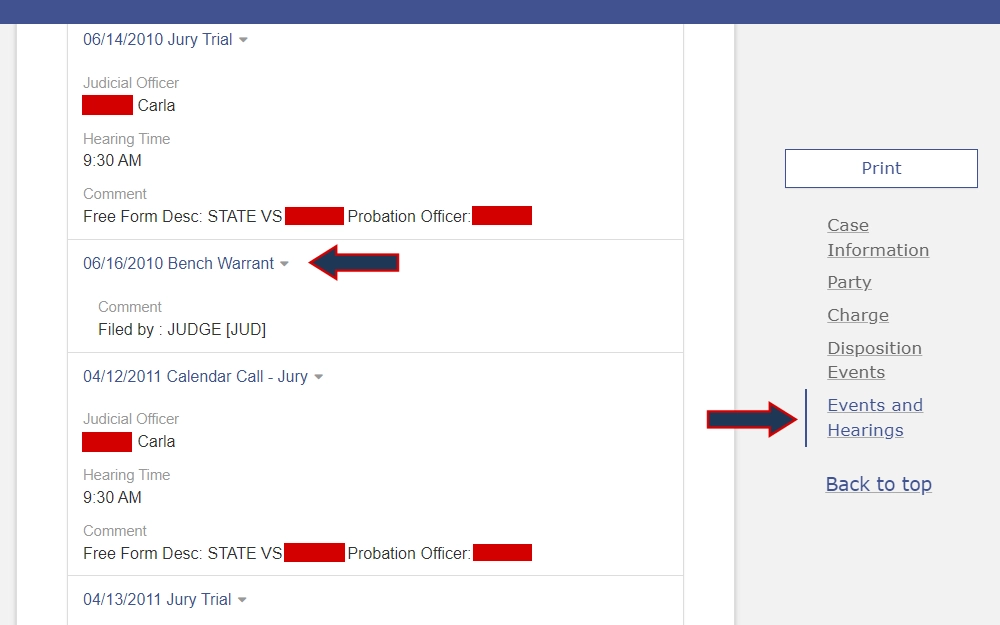
Citizens can also request and purchase hard copies of these records through Re:SearchGA (an authorized third-party vendor). This service requires registration and is mostly free; however, a premium subscription allows additional features such as in-document text search or getting case alerts. Select ‘Gwinnett County’ when searching for records, as this tool serves multiple counties.
Lastly, citizens may seek official records from the Clerk of Court of Superior, State, Magistrate, and Juvenile Courts at the courthouse from Monday to Friday, 8 AM to 5 PM; the address is listed below for convenience. Charges for copying are on this fee schedule. Inquirers are encouraged to call the clerk at 770.822.8100 with any questions.
Gwinnett County Clerk of Superior Court
75 Langley Drive
Lawrenceville, Georgia 30046
Retrieve Warrant Information Through the Sheriff’s Office: The Gwinnett County Sheriff’s Office is the county’s primary law enforcement agency and serves warrants received from the courts. Therefore, it’s a viable source to acquire information on wanted persons through its Uniforms Warrant Unit; this unit can be reached at 770.619.6852.5
The sheriff’s office doesn’t maintain an online database or list of wanted individuals.
However, the agency does have an online Gwinnett County Inmate Search Tool for free public use. This instrument lets users see if warrants have been issued against current or released inmates. This information will be found in the charges section of the record.
There will be a warrant number and a description of the charge that led to the order (such as a probation violation or failure to appear in court).
The tool can be queried using the names of the inmates, booking dates, and types of inmates (current or released).
Subsequently, citizens may contact the agency by calling 770.619.6500 or visiting the sheriff’s location below to find wanted fugitives in the community. Individuals should note that if they have active warrants, they risk being placed into custody if they visit the office.
Gwinnett County Sheriff’s Office
2900 University Parkway
Lawrenceville, Georgia 30043
Moreover, citizens can make an open records request for warrant data. They may submit an online open records request via a portal.6 Interested individuals may find fees incurred for making open record requests.
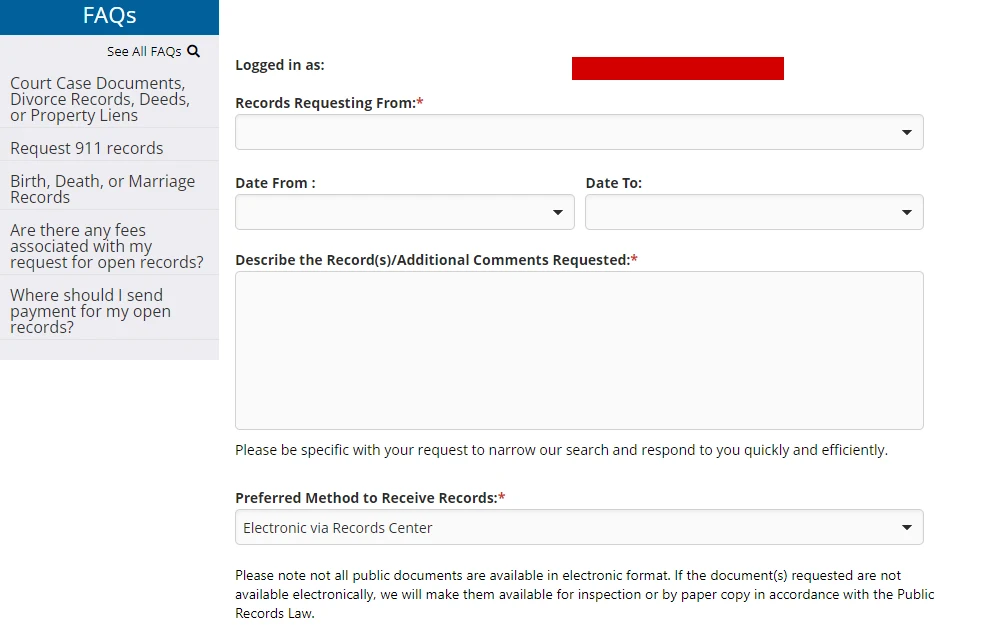
Call 770.619.6539 to acquire general information for open records.
Lastly, citizens can submit an anonymous tip online if they have spotted fugitives.8 They may also call the sheriff’s office at the abovementioned number.
Find Wanted Persons Through Local Jurisdictions: In some cases, patrons may retrieve warrant records from local jurisdictions such as city police departments and municipal courts. The focus of exemplifying how to search for wanted persons from cities will be distilled to the county’s most populated centers: Peachtree Corners, Duluth and Lawrenceville.
The Peachtree City Police Department does not have an active online list of wanted persons. However, interested persons may contact them via phone at 770.487.8866 or by visiting the police station to inquire about the status of a warrant. Citizens may also submit tips on crimes and fugitives online.
Peachtree City Police Department
350 South Highway 74
Peachtree City, Georgia 30269
Citizens in Duluth will need to contact the Clerk of Municipal Court to acquire information on warrants and how they can resolve them.9 The best way to do this would be to visit the courthouse in Duluth at the address below or contact the Clerk’s Office by calling 770.476.3434.
Duluth Municipal Court
3276 Buford Highway
Duluth, Georgia 30096
Patrons may also submit an open records request for court documents to find information on warrants. This is accomplished by filling a Court Open Records Request.10 The request can also be made by email, mail, or fax.
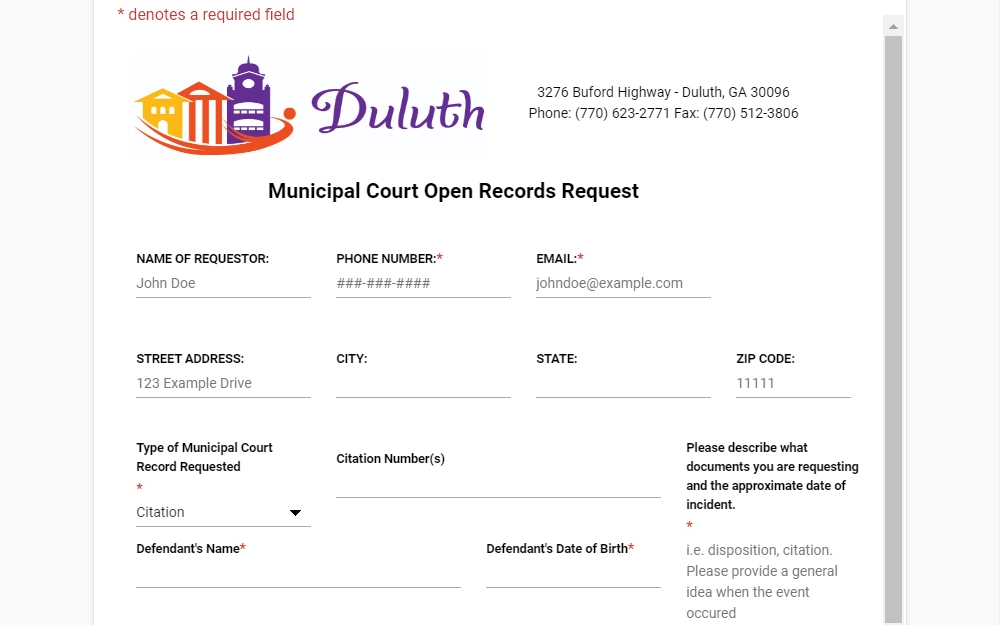
Email or fax the request to the Municipal Court at [email protected] or 678.512.3786. There is a $0.10 per page charge for copies and a research cost for retrieval that takes longer than 15 minutes.
As with Duluth, citizens can contact the Lawrenceville Clerk of Municipal Court by making an in-person visit Monday through Friday, 8 AM to 5 PM, at the lower level of the City Hall at the address below.
Lawrenceville Municipal Court
City Hall Lower Level
70 South Clayton Street
Lawrenceville, Georgia 30046
Defendants can also clear warrants at this agency; the Gwinnett County Sheriff’s Office handles probation apprehension orders at the county level. For questions and inquiries, call 770-963-3288 or email [email protected].
How Do You Run a Statewide Warrant Lookup in Georgia?
There is no official statewide database that citizens can query to conduct a warrant look-up; however, patrons can find apprehension orders from Georgia Courts. The Judicial Council of Georgia provides a portal for citizens to look up court records in any of its 159 counties.
Users can select the county they believe the warrant originated and will thereafter be directed to re: SearchGA where they may search court records throughout Georgia. This tool, as seen earlier, is mostly free to use.
Nevertheless, a Paid Subscription version allows obtaining additional features such as tracking cases and searching within the records’ texts. Registration is free unless users require more functionality. Interested parties can search through court documents and find warrant data through criteria such as party name, case number and date filed.
The Georgia Bureau of Investigation (GBI) has a list of wanted individuals; however, interested parties should note this index is not limited to fugitives but also missing persons and unsolved homicides.11
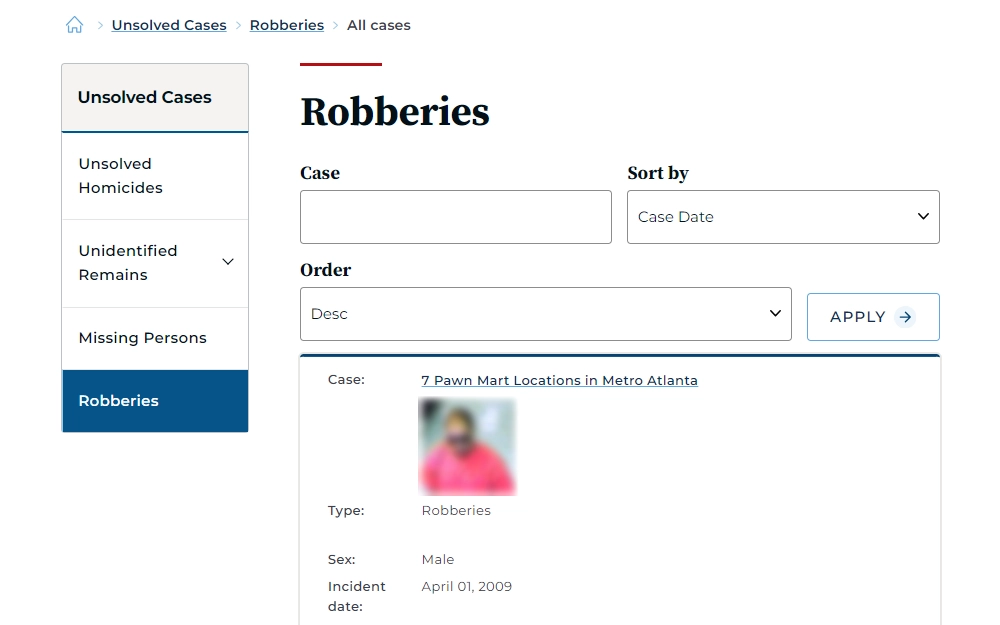
For more information, call 404.244.2600 or visit the GBI at the address below:
Georgia Bureau of Investigation
3121 Panthersville Road
Decatur, Georgia 30034
An Overview of Warrant Types
There are several types of warrants in Gwinnett County, the most common ones being search, bench, and arrest apprehension orders. Judges, magistrates, and sometimes clerks of courts issue warrants against citizens authorizing law enforcement agencies to arrest them, search their premises, or even take their DNA samples.13
The Fourth Amendment permits warrants, and they can only be issued where probable cause is documented.14
Search Warrant— Search warrants are court orders that permit law enforcement officials to search property and vehicles and to seize items that may be of interest to an investigation.
Arrest Warrant—Judges issue arrest warrants to individuals suspected of committing crimes, allowing the police to arrest them and take them into custody. These types of warrants will be mostly for misdemeanors since law enforcement officials will typically have enough probable cause to arrest suspects of felonies.
In Gwinnett County and Georgia, citizens may also file an application for an arrest warrant if they feel they are victims of a crime and the suspect was not arrested. There are several kinds of arrest warrants, including bench, capias, and traffic writs (written orders).
Capias Warrant— Defendants found guilty or have made a plea are often required to pay fines.
When they fail to do this, the courts will issue capias warrants against them.
Civil Capias Warrant—Civil courts issue these types of warrants against defendants who repeatedly do not comply with the court’s orders.
Bench Warrant—Bench warrants are issued by judges at the bench when defendants fail to appear for their scheduled court hearings.
Alias Warrant—Individuals who do not appear in court before a plea is entered will receive alias warrants.
Traffic Warrant— Drivers who do not pay fines due to traffic violations risk having traffic warrants issued against them.
Child Support Warrant— Parents not in the custody of a child are often obligated to make monthly child maintenance payments. If they fail to do this, judges will issue child support warrants.
Probation & Parole Warrant—Convicted offenders released under community supervision must abide by certain conditions, including reporting to the probation and parole officers or not committing crimes. The violations will cause offenders to receive probation and parole warrants, which may cause them to be re-incarcerated.
Governor Warrant—Issued by governors, these warrants permit law enforcement agencies to extradite suspects who have committed crimes out of state.
Fugitive Warrant— A fugitive warrant will allow the police in Gwinnett County to take a suspect into custody who may have allegedly committed crimes out of state.
Federal Arrest Warrant—These are warrants issued to individuals who have committed federal crimes. They will typically involve agencies such as the Federal Bureau of Investigations (FBI), U.S. Marshals, Bureau of Alcohol, Tobacco, Firearms & Explosives (ATF) and the Drug Enforcement Administration (DEA).
Warrants are active and outstanding when they have not yet been implemented; this happens when the defendant has been taken into custody or the police have completed searching a premises. They will also cease to be active should the subject resolve them through paying fines or turning themselves in. The methods to resolve warrants appear in the following section.
How To Settle an Active Warrant in Gwinnett County
Upon finding out a warrant has been issued against themselves or someone else, citizens will need to take certain steps, such as paying outstanding fines or getting in touch with the courts to avoid arrest. If they’ve found out that someone else has a warrant, they should make an effort to inform the individual and allow them to resolve it.
In the case of a neighbor or a stranger, they might want to inform law enforcement – particularly if the fugitive could pose a danger to themselves or the community. In Gwinnett County, citizens can submit tips online through the sheriff’s office or call the tip line at 770.513.5480.8 They can also reach out to Crime Stoppers and perform an anonymous tip online or call 404.577.TIPS (8477).
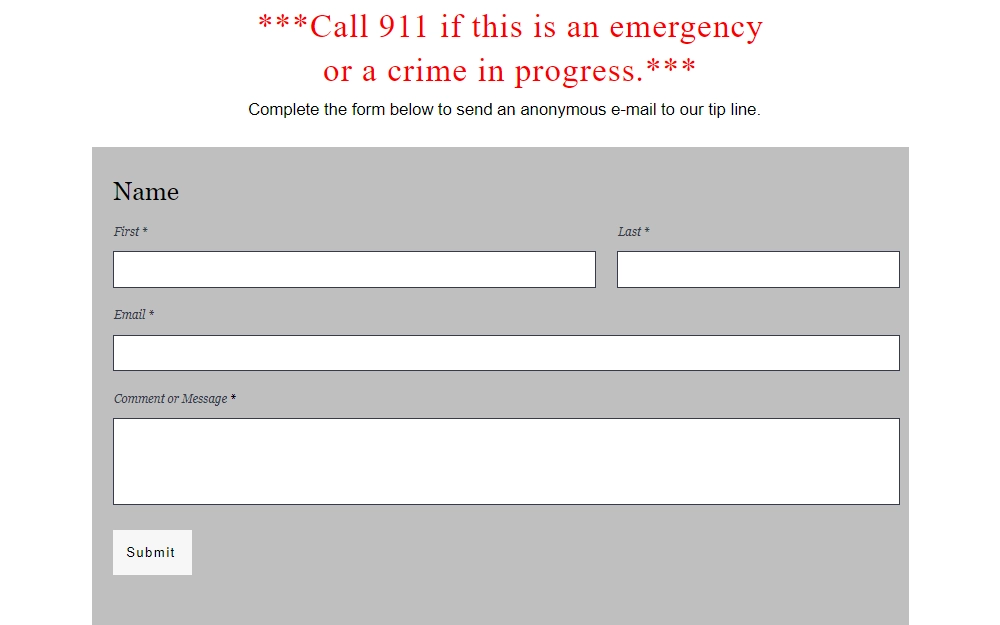
The Georgia Bureau of Investigation also permits citizens to submit information online on wanted individuals found on its website, as seen in the previous sections.
To settle a warrant for oneself, citizens should get in touch with the Gwinnett Clerk of Court or a local city clerk (if the warrant originated there) to pay fines or reschedule court dates that have been missed. They’ll also receive instructions on how to resolve their warrants.
Regarding traffic warrants, drivers can pay their tickets online. In the case of child support warrants, monthly maintenance payments can be paid through the Georgia Department of Human Services’ Division of Child Support Services.15
In the case of more serious warrants such as those related to felonies, it’s always recommended to enlist the services of a lawyer who can subsequently quash the order, dismiss or have the charges reduced.
Sometimes, defendants must turn themselves in to the sheriff’s office at the Gwinnett County Sheriff’s Detention Center; it’s located at the address below. Before doing this, they should ensure they’ve retained the services of a lawyer and bond agent and informed their family members.
Gwinnett County Jail
2900 University Parkway
Lawrenceville, GA 30043
Anyone can execute a Gwinnett County warrant search to find information on wanted individuals at the county and state levels. This article furnishes helpful information from public agencies to help citizens navigate public agencies.
References
1Georgia Attorney General’s Office. (2012). The Open Records Act. Retrieved February 19, 2024, from <https://law.georgia.gov/sites/law.georgia.gov/files/imported/vgn/images/portal/cit_1210/62/51/186385699r1.pdf>
2U.S. Department of Justice, Office of Information Policy (OIP). (2022, January 21). The Freedom of Information Act, 5 U.S.C. § 552. Retrieved February 19, 2024, from <https://www.justice.gov/oip/freedom-information-act-5-usc-552>
3Gwinnett Courts Portal. (n.d.). Gwinnett Courts Portal. Retrieved February 19, 2024, from <https://odyssey.gwinnettcourts.com/Portal/>
4Gwinnett Courts Portal. (n.d.). Details. Retrieved February 19, 2024, from <https://odyssey.gwinnettcourts.com/Portal/Home/WorkspaceMode?p=0#OtherEvents>
5Gwinnett County Sheriff’s Office. (n.d.). Field Operations Division. Retrieved February 19, 2024, from <https://www.gwinnettcountysheriff.org/field-operations-division>
6Gwinnett County, Georgia. (n.d.). Open Records. Retrieved February 19, 2024, from <https://www.gwinnettcounty.com/web/gwinnett/departments/communications/MediaRelations/OpenRecords>
7Gwinnett Public Open Records Center. (n.d.). Service Request. Retrieved February 19, 2024, from <https://gwinnettcountyga.govqa.us/WEBAPP/_rs/(S(kvnqarsxwgj21s33kyydrqrh))/RequestOpen.aspx?sSessionID=2072447180:45577MEORAFEHIUUDFCWHITLTDXFA&rqst=1>
8Gwinnett County Sheriff’s Office. (n.d.). Tip Line. Retrieved February 19, 2024, from <https://www.gwinnettcountysheriff.org/tip-line>
9Duluth Municipal Court. (n.d.). Warrants. Retrieved February 19, 2024, from <https://www.duluthga.net/services/municipal_court/warrants.php>
10Duluth Municipal Court. (n.d.). Open Records Request. Retrieved February 19, 2024, from <https://duluthga.justfoia.com/Forms/Launch/77bb4b18-1cee-461d-bb41-bc64f9b4fb45>
11Georgia Bureau of Investigation. (n.d.). All Cases. Retrieved February 19, 2024, from <https://gbi.georgia.gov/cases?page=4>
12Georgia Bureau of Investigation. (n.d.). Robberies. Retrieved February 19, 2024, from <https://gbi.georgia.gov/cases/robberies>
13Cornell Law School, Legal Information Institute. (n.d.). Wex -Warrant. Retrieved February 19, 2024, from <https://www.law.cornell.edu/wex/warrant>
14Gwinnett County, Georgia. (n.d.). Glossary of Legal Terms. Retrieved February 19, 2024, from <https://www.gwinnettcounty.com/web/gwinnett/departments/districtattorney/resources/glossaryoflegalterms>
15State of Georgia. (n.d.). Pay Child Support. Retrieved February 19, 2024, from <https://georgia.gov/pay-child-support>
